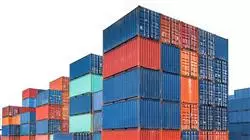University certificate
Accreditation/Membership
The world's largest faculty of engineering”
Introduction to the Program
Thanks to this Master's Degree you will achieve an unique and up-to-date specialization in Port Management and Intermodal Transport”

Globalization has highlighted the importance of having an efficient commercial port logistics, capable of solving different situations (economic, health, traffic, personnel), while its management requires the mastery of the latest technologies in these areas and operability.
Given this reality, the maritime sector is on the rise and requires professionals with a highly specialized, up-to-date vision on Port Management and Intermodal Transport. In this scenario, this 100% online university program of 1,500 teaching hours, created and developed by an excellent team of professionals with more than two decades of experience in this field, is born.
It is an advanced program, which presents a theoretical-practical approach and numerous didactic materials such as multimedia pills, interactive diagrams, essential readings and case study simulations. All this provides dynamism and effective learning about the latest trends in management models, the optimization of the operation of intermodal transport infrastructures, or the existing
international regulations and standards.
In addition, during the course of this program, graduates will obtain new knowledge in a much more agile way, thanks to the Relearning system. A method based on the reiteration of content, which will allow graduates to consolidate the concepts in a simple way and without dedicating long hours to study and memorization.
Undoubtedly, an unique opportunity for professional growth under the guidance of the best experts and with a flexible pedagogical methodology Students only need a digital device with internet connection (Tablet, cell phone or computer) to view the content hosted on the virtual platform.
Study at the best rated university in the world by its students according to the Trustpilot platform (4.9/5)”
This Master's Degree in Port Management and Intermodal Transportation contains the most complete and up-to-date program on the market. The most important features include:
- The development of case studies presented by experts in Port Management and Intermodal Transportation
- The graphic, schematic and eminently practical content of the system provides cutting-edge and practical information on those disciplines that are essential for professional practice
- Practical exercises where the self-assessment process can be carried out to improve learning
- Its special emphasis on innovative methodologies
- Theoretical lessons, questions to the expert, debate forums on controversial topics, and individual reflection assignments
- Content that is accessible from any fixed or portable device with an Internet connection
Enroll now in a university degree that fits your professional aspirations in the port sector”
The program’s teaching staff includes professionals from the sector who contribute their work experience to this training program, as well as renowned specialists from leading societies and prestigious universities.
The multimedia content, developed with the latest educational technology, will provide the professional with situated and contextual learning, i.e., a simulated environment that will provide immersive education programmed to learn in real situations.
This program is designed around Problem-Based Learning, whereby the professional must try to solve the different professional practice situations that arise throughout the program. For this purpose, the students will be assisted by an innovative interactive video system created by renowned and experienced experts.
Learn more about the characteristics of commercial port management through the best didactic materials"

Delve into maritime-port logistics and international transport chains from the comfort of your home"
Why study at TECH?
TECH is the world’s largest online university. With an impressive catalog of more than 14,000 university programs available in 11 languages, it is positioned as a leader in employability, with a 99% job placement rate. In addition, it relies on an enormous faculty of more than 6,000 professors of the highest international renown.

Study at the world's largest online university and guarantee your professional success. The future starts at TECH”
The world’s best online university according to FORBES
The prestigious Forbes magazine, specialized in business and finance, has highlighted TECH as “the world's best online university” This is what they have recently stated in an article in their digital edition in which they echo the success story of this institution, “thanks to the academic offer it provides, the selection of its teaching staff, and an innovative learning method aimed at educating the professionals of the future”
A revolutionary study method, a cutting-edge faculty and a practical focus: the key to TECH's success.
The most complete study plans on the university scene
TECH offers the most complete study plans on the university scene, with syllabuses that cover fundamental concepts and, at the same time, the main scientific advances in their specific scientific areas. In addition, these programs are continuously being updated to guarantee students the academic vanguard and the most in-demand professional skills. In this way, the university's qualifications provide its graduates with a significant advantage to propel their careers to success.
TECH offers the most comprehensive and intensive study plans on the current university scene.
A world-class teaching staff
TECH's teaching staff is made up of more than 6,000 professors with the highest international recognition. Professors, researchers and top executives of multinational companies, including Isaiah Covington, performance coach of the Boston Celtics; Magda Romanska, principal investigator at Harvard MetaLAB; Ignacio Wistumba, chairman of the department of translational molecular pathology at MD Anderson Cancer Center; and D.W. Pine, creative director of TIME magazine, among others.
Internationally renowned experts, specialized in different branches of Health, Technology, Communication and Business, form part of the TECH faculty.
A unique learning method
TECH is the first university to use Relearning in all its programs. It is the best online learning methodology, accredited with international teaching quality certifications, provided by prestigious educational agencies. In addition, this disruptive educational model is complemented with the “Case Method”, thereby setting up a unique online teaching strategy. Innovative teaching resources are also implemented, including detailed videos, infographics and interactive summaries.
TECH combines Relearning and the Case Method in all its university programs to guarantee excellent theoretical and practical learning, studying whenever and wherever you want.
The world's largest online university
TECH is the world’s largest online university. We are the largest educational institution, with the best and widest online educational catalog, one hundred percent online and covering the vast majority of areas of knowledge. We offer a large selection of our own degrees and accredited online undergraduate and postgraduate degrees. In total, more than 14,000 university degrees, in eleven different languages, make us the largest educational largest in the world.
TECH has the world's most extensive catalog of academic and official programs, available in more than 11 languages.
Google Premier Partner
The American technology giant has awarded TECH the Google Google Premier Partner badge. This award, which is only available to 3% of the world's companies, highlights the efficient, flexible and tailored experience that this university provides to students. The recognition as a Google Premier Partner not only accredits the maximum rigor, performance and investment in TECH's digital infrastructures, but also places this university as one of the world's leading technology companies.
Google has positioned TECH in the top 3% of the world's most important technology companies by awarding it its Google Premier Partner badge.
The official online university of the NBA
TECH is the official online university of the NBA. Thanks to our agreement with the biggest league in basketball, we offer our students exclusive university programs, as well as a wide variety of educational resources focused on the business of the league and other areas of the sports industry. Each program is made up of a uniquely designed syllabus and features exceptional guest hosts: professionals with a distinguished sports background who will offer their expertise on the most relevant topics.
TECH has been selected by the NBA, the world's top basketball league, as its official online university.
The top-rated university by its students
Students have positioned TECH as the world's top-rated university on the main review websites, with a highest rating of 4.9 out of 5, obtained from more than 1,000 reviews. These results consolidate TECH as the benchmark university institution at an international level, reflecting the excellence and positive impact of its educational model.” reflecting the excellence and positive impact of its educational model.”
TECH is the world’s top-rated university by its students.
Leaders in employability
TECH has managed to become the leading university in employability. 99% of its students obtain jobs in the academic field they have studied, within one year of completing any of the university's programs. A similar number achieve immediate career enhancement. All this thanks to a study methodology that bases its effectiveness on the acquisition of practical skills, which are absolutely necessary for professional development.
99% of TECH graduates find a job within a year of completing their studies.
Master's Degree in Port Management and Intermodal Transportation
In an increasingly interconnected world, port management and intermodal transportation play a fundamental role in the efficiency and growth of the global economy. If you are looking for a program that provides you with the necessary tools to perform in this field, you have come to the right place. At TECH Global University, you will find the Master’s Degree in Port Management and Intermodal Transportation, an innovative program that offers the opportunity to acquire specialized knowledge and leadership skills to stand out in this dynamic field. Through a 100% online study plan, you will explore all aspects of port management and intermodal transportation, from logistics and port operations to transport planning and supply chain management. This comprehensive approach will prepare you to address the complex challenges of the industry. Likewise, you will become familiar with the latest technologies and trends in the sector, including port automation, route optimization, and data management. In this way, you will be prepared to apply innovative solutions in your professional career.
Learn everything about port management and intermodal transportation
The demand for professionals in port management and intermodal transportation continues to grow worldwide. Therefore, this high-level Master’s Degree will prepare you for leadership roles in ports, logistics companies, port authorities, and related organizations. The program features highly qualified faculty members and professionals with experience in port management and intermodal transportation. As you progress through the program, you will learn from leading experts in the field and gain a practical and up-to-date perspective. In addition, the methodology includes practical exercises and real case studies, allowing you to apply your knowledge in real-world scenarios. Therefore, you will develop key skills that are highly valued in the industry. As a result, you will be ready to lead in the industry that drives global trade and connectivity. Enroll now, and together we will contribute to the success and efficiency of logistics and transportation worldwide.







